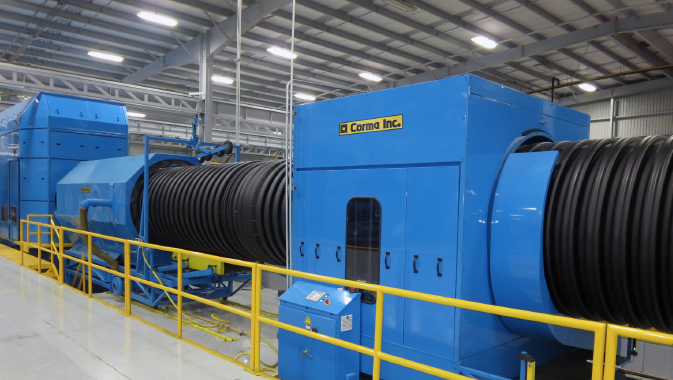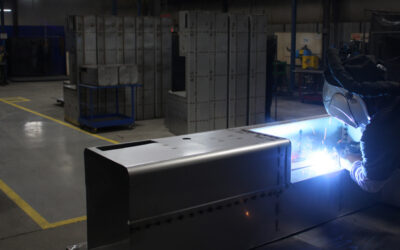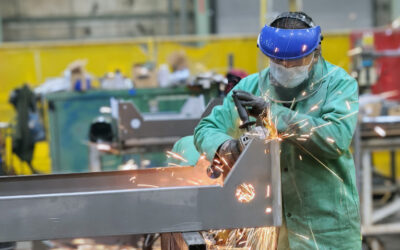Corma prides itself on being the most trusted manufacturer of corrugated pipe machines in the world, with forty-five years of knowledge in the industry. This machinery manufacturer produces specialized dies that allow recycled plastics to be given meaningful, functional second lives in ways never imagined before.
~
Our oceans are teeming with plastic debris from our consumer lifestyles, but what if there was an unexpected solution for using waste plastic to our advantage rather than dumping it in landfills and in the sea? Imagine a world where discarded plastic is transformed into corrugated piping that serves as drainage, conduit protection, and much more. Then imagine a pipe that is better quality, has longevity similar to concrete, and has superior seismic-resistant qualities that are less affected by seismic activity. With machines built by Corma, in Concord, Ontario, all this is now possible.
Corrugated plastic pipes offer a much-needed alternative to concrete pipes, which unfortunately pose a number of significant drawbacks, like its incredibly heavy weight. Concrete pipes are produced in short lengths. They generally come in one-metre lengths, which results in six times more joints than corrugated pipe installation does. Concrete is also tricky to seal tightly against water, and because of the material’s characteristics, water erosion means a markedly shorter service life before the need for remediation arises, as opposed to the fifty-year to one-hundred-year mostly service-free lifespan of a plastic corrugated pipe. The size and cost of the equipment needed to transport and install concrete pipes are also much bigger and a lot more expensive when compared to those needed for corrugated pipes.
“Thanks to all my father’s inventions, it is safe to say that every corrugated piping machine in the country contains an element of our technology,” says Stefan Lupke, Executive Vice-President.
Corma was founded by Manfred Lupke, Stefan’s father, who created more than one thousand patents since the company’s inception in 1973. Manfred was even given the honour of being accepted into the Plastics Hall of Fame for his admirable work.
Life for the Lupkes did not start out in Canada, however. Manfred brought his family from Germany in 1969 and, although he was recognized as a fully qualified engineer in Germany, he was legally prohibited from practicing engineering in Canada. So, with a family to raise and few resources at his disposal, Manfred was forced to take up employment as a maintenance manager at a small firm.
Here, the owner approached him one day enquiring whether he would be able to build a machine that could manufacture a certain type of pipe. He had much mechanical knowledge and courage, but no chemical background, yet he took on the challenge. Manfred managed to build the machine but realized that, if he wanted to make continuous length pipes, he needed to find a solution to keeping them from tearing every time they left the mold. One night, he woke up and suddenly had the answer. He would create a separation system that allowed the blocks to separate in parallel to allow the pipes to be released in continuous lengths.
He built several machines, but when the oil crash of the early seventies hit, people started pulling out of plastic, fast. Not convinced that the markets would return, his boss allowed him to take his design to market privately. In 1973, he hired a hall in Concord and started building the machines and other metal fabrications. He had never seen a piping machine in his life and later discovered that his vertical design was quite revolutionary since the other machines in the market were horizontally orientated, which comes with challenges that his machine naturally didn’t have. Needless to say, this was a very proud moment for the company.
Manfred went on to improve his machines even further when he changed to polyvinyl chloride (PVC), which was much more common in Europe in the seventies. At the time, most of North America was using polyolefin pipe as it is produced, which needs more cooling capacity, as it takes longer to set up the polyolefin as compared to PVC pipes.
The innovation continued and is still ongoing today, as Corma remains a world leader in corrugated pipe manufacturing, all because of Manfred’s drive toward perpetual improvement. Not surprisingly, Manfred’s passion for his field means that he is still working and inventing better ways of doing things. For him, there is no such thing as retirement from doing what you love.
The company’s innovation is not limited to its products, either. The company’s approach to daily operations is decidedly modern with the constant collaboration of its nearly two hundred employees. “We are really proud of the fact that everybody feels an attachment to what they do. Their investment makes a great difference to our end product,” says Stefan. It makes sure that its team is happy, but the good work does not stop there. Corma also works extensively to ensure a good future for nearby Mackenzie Vaughan Hospital. Manfred had been on the board for many years, and the company has contributed too many fundraising events.
The pipes manufactured by its machines play a huge role in several applications. Most commonly, they are used in agriculture and drainage and to protect underground technology installations like telecommunication conduits. Other uses include the small-diameter tooling found in cars, and with the automotive industry booming, this is currently very popular. These pipes are also used in washing machines and dishwashers as discharge hoses and in medical devices as respiratory tubing.
Corma gives customers the assurance that they are using a product with a much smaller environmental footprint as its production means that less space is used and a much larger size range of pipe can be produced. With its clean, air cooled machines, the entire process is much faster and much more energy efficient than with water cooled machines. The die changeover from one product to the next is faster, and because there is little to no wear on the tooling, that too has an incredibly long service life.
Stefan believes that the plastic industry must be held responsible for its conduct and that a continued push towards using recycled materials will create practical alternatives to dumping. Corma’s goal is to build increasingly environmentally friendly equipment to lessen the number of concrete pipes used. “More corrugated plastic pipes means savings in CO2 emissions from fewer trucks on the road,” says Stefan.
In a bid to compete with metal and concrete pipes, pipe manufacturers strive to make ever bigger pipes, but materials have proven limiting. Spiral pipes made from high-density polyethylene (HDPE) are very heavy and require a continuous, slowly welded seam which can crack under heavy loads. In contrast, Corma machines, can manufacture two-metre, and in the future, three-metre inner diameter corrugated pipes that are light, yet durable and exceptionally portable at the standard of six-metre lengths. This allows its customers to be increasingly competitive in all areas where concrete pipes are traditionally used.
Of course, joining these pipes is the next big concern, as cracks can cause serious problems, like leaks. Therefore, to protect against soil or water damage, the pipes must be joined effectively. Corma has developed a super coupler that provides a long inner sleeve that adds heavy load carrying capacity to the entire structure of the pipe and allows it to be buried deep underground with great success, even in earthquake-prone areas, as the extended sleeve is long enough that possible movements in the joint do not make a difference. In fact, Manfred co-authored a paper presented on this new technology at the Plastic Pipes XIX conference and exhibition in Las Vegas in September this year.
“Customers want to go bigger, and they want to go faster. This is why we developed our 40-Series corrugator machine that has a new drive system as well as a cooling system that allows clients to achieve thirty percent higher outputs than the earlier 30-Series machines offered,” says Manfred.
Corma offers consultation on all parts of a project, including profile design as well as civil engineering support. It can also advise on what ancillary equipment to buy. Depending clients’ requirements, it can also buy equipment – like the extruders that complete piping systems – on clients’ behalf.
Part of Corma’s support service is its assistance in helping customers adhere to industry standards like those of the Canadian Standards Association (CSA), American Society for Testing and Materials (ASTM), and American Association of State Highway and Transportation Officials (AASHTO), as well as a host of international standards that countries around the world are expected to uphold.
Of course, all its machines are ISO 9001 certified and adhere to European technical standards CE Mark. With such an incredible legacy of innovation, Corma’s name is well-known globally, and the company has delivered machines to more than one hundred countries, with a vast reach across the Americas, Europe and further afield. It even has a sales and service center in Gujarat, on the west coast of India.
“The market for our product is huge there, and we have sold a lot over the past year. They have a great need for infrastructure, which drives our sales. We are educating people on the value of having a good-quality, reliable product with longevity in place rather than investing in cheap, and low-quality installations. We really sell peace of mind,” says Manfred.
Corma machines are easy to operate, trustworthy, and deliver quality pipes every time, something that cannot always be said of cheaper imitations. A good return on investment can be expected after only two years, and Corma’s products last, so they do not have to be replaced as often as cheaper versions. From environmental considerations to budget considerations, there really is no question as to which is the best option.
This family-owned-and-managed company guarantees continuity and above all, great service. It is an authority in the field and offers extensive consulting services together with a complete technical solution to its clients’ challenges. “We’re the type of company that is so trusted, clients share their marketing plans with our technical team who helps them identify the best ways to achieve their long-term goals with comprehensive solutions,” says Stefan. “Corma delivers what others promise. While there are foreign producers who will say what it takes to get the job, they can’t beat Corma on quality or technical ability,” he adds.













